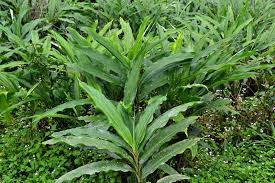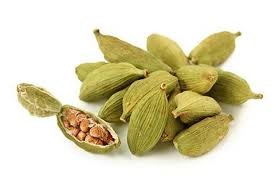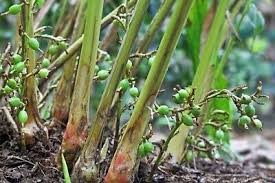
 Cardamom, sometimes cardamon or cardamum, is a spice made from the seeds of several plants in the genera Elettaria and Amomum in the family Zingiberaceae. Both genera are native to the Indian subcontinent and Indonesia. They are recognized by their small seed pods: triangular in cross-section and spindle-shaped, with a thin, papery outer shell and small, black seeds; Elettaria pods are light green and smaller, while Amomum pods are larger and dark brown.
Cardamom, sometimes cardamon or cardamum, is a spice made from the seeds of several plants in the genera Elettaria and Amomum in the family Zingiberaceae. Both genera are native to the Indian subcontinent and Indonesia. They are recognized by their small seed pods: triangular in cross-section and spindle-shaped, with a thin, papery outer shell and small, black seeds; Elettaria pods are light green and smaller, while Amomum pods are larger and dark brown.
The two main types of cardamom are:
True or green cardamom ( or white cardamom when bleached) comes from the species Elettaria cardamomum and is distributed from India to Malaysia. What is often referred to as white cardamon is actually Siam cardamom, Amomum krervanh.
Black cardamom, also known as brown, greater, large, longer, or Nepal cardamom, comes from the species Amomum subulatum and is native to the eastern Himalayas and mostly cultivated in Eastern Nepal, Sikkim, and parts of Darjeeling district in West Bengal of India, and southern Bhutan.




Medicinal uses
Cardamom, prized for its rich flavor and aroma, also offers numerous health benefits:
Incorporate cardamom into your daily routine by adding it to meals or brewing cardamom tea. Remember to consult with a healthcare professional before using cardamom for medicinal purposes.
When considering the use of cardamom for its medicinal benefits, it's important to be aware of certain precautions and potential interactions. Here are some key points to keep in mind:
Precautions
Interactions
Always inf or m your healthcare provider about any herbs, supplements, or medications you are taking to avoid potential interactions or adverse effects. It's essential to use cardamom and other natural remedies responsibly and under professional guidance, especially if you have underlying health conditions or are taking medications.

Address: B23-2, Khayam Complex, Hormozan St., Phase 2, Sanat Sq., Tehran, Iran
Tel: +98 21 88 08 77 01
Mobile: +98 912 502 51 47
All services and products of this site, as the case may be, have the necessary licenses from the relevant authorities and the activities of this site are subject to the laws and regulations of the Islamic Republic of Iran


